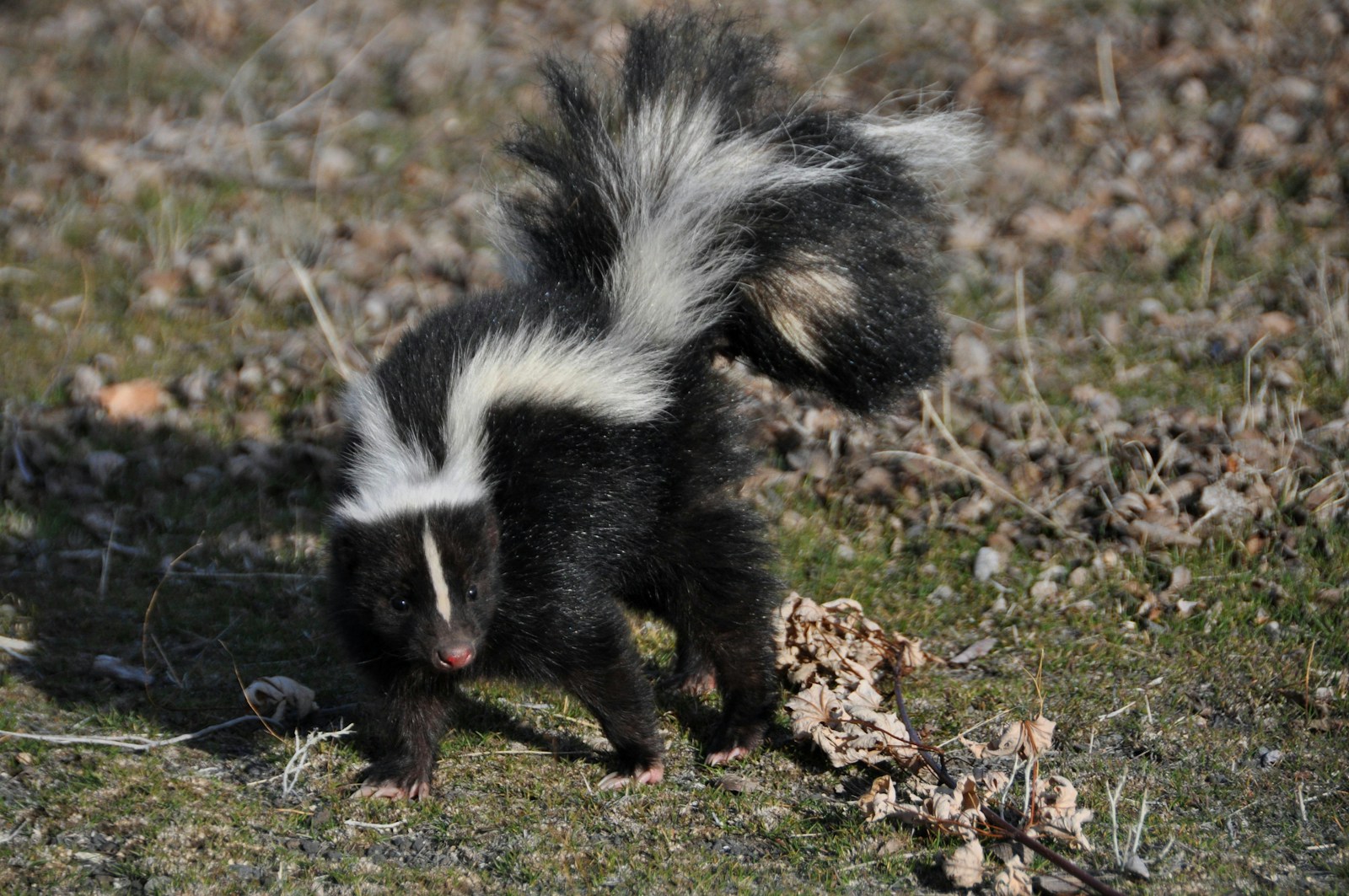Ah, the unmistakable stench of a skunk’s spray! This pungent aroma, a hallmark of unexpected encounters with these nocturnal creatures, can transform your serene backyard into a no-go zone, suffused with an odor that clings with astonishing tenacity. Skunks, while generally non-aggressive and harmless, wield a defensive mechanism that is formidable and notoriously difficult to eradicate. If you’ve ever experienced the lingering scent of skunk spray, you know it’s an ordeal that can put a damper on outdoor enjoyment. But fear not, as there are tried-and-true methods to reclaim the freshness of your outdoor spaces.
Understanding Skunk Spray
The potent weapon in a skunk’s arsenal is a secretion known as thiol. This sulfur-containing organic compound is the culprit behind the spray’s notoriously foul odor. Thiol’s molecular structure allows it to bind tenaciously to various surfaces and fabrics, making its removal a challenging task. The spray is a skunk’s defense mechanism, deployed when they feel threatened, and its effectiveness in deterring predators is unparalleled in the animal kingdom.
Busting Common Myths about Skunk Odor
Before diving into removal strategies, it’s crucial to dispel some myths. Many believe that skunk odor dissipates naturally over time. While this is true to an extent, relying solely on nature can mean enduring the smell for weeks. Another myth is that tomato juice is a surefire solution. Although it can help, it’s not the most effective method for large areas in your yard.
12 Effective Removal Methods
1. The Power of Chemistry: Baking Soda and Hydrogen Peroxide
A classic remedy involves a mixture of 3% hydrogen peroxide, baking soda, and liquid soap. This concoction, when applied to the tainted areas, initiates a chemical reaction that neutralizes the odor-causing molecules. It’s a straightforward yet powerful method that harnesses basic household items for odor elimination.
- Pro Tip: Apply the mixture immediately after mixing, as it loses effectiveness over time. Avoid using on colored fabrics or surfaces prone to bleaching.
2. Enzyme-Based Cleaners: Nature’s Microscopic Helpers
Products like Nature’s Miracle or Skunk Off contain enzymes that break down the thiol molecules, attacking the odor at its source. These cleaners are biodegradable and safe, offering an environmentally friendly solution to skunk odor removal.
- Case Study: A homeowner in Oregon reported a 90% reduction in odor within 24 hours of applying an enzyme cleaner to their sprayed patio.
3. Vinegar Solution: Acidic Odor Neutralization
A simple blend of white vinegar and water can be sprayed on affected areas to neutralize the skunk odor. The acidic nature of vinegar helps break down the thiol compounds, mitigating the stench effectively.
- Additional Tip: Add a few drops of dish soap to enhance the solution’s ability to penetrate surfaces.
4. Aromatic Rescue: Essential Oils
Essential oils like lavender, tea tree, and lemon not only offer pleasant fragrances but also possess natural deodorizing properties. When mixed with water and sprayed on impacted areas, they can provide a refreshing respite from the skunk’s pungent legacy.
- DIY Recipe: Mix 10 drops of essential oil with a cup of water in a spray bottle for an easy, aromatic solution.
5. Activated Charcoal: Nature’s Purifier
Sprinkling activated charcoal powder on the affected areas can absorb and neutralize odors. This porous material is renowned for its filtration properties, offering a passive yet effective method to tackle skunk spray residue.
- Usage Note: For best results, leave the charcoal on the surface overnight before sweeping it away.
6. Professional Intervention: Skunk Odor Removal Services
For persistent or overwhelming odors, professional services can offer relief. These experts employ specialized equipment and advanced cleaning solutions to tackle severe skunk odor issues, providing peace of mind and a stench-free environment.
- Consideration: While more costly, professional services guarantee thoroughness, especially for large areas.
7. Citrus Solutions
Citrus fruits like oranges and lemons are not only pleasant to the human nose but also act as natural odor eliminators. You can make a citrus spray by boiling citrus peels in water and then using the cooled solution to spray over affected areas. The citrus oils help neutralize skunk odors and can leave a fresh scent behind.
- Example: A gardener in Florida found that orange peel spray not only reduced skunk odor but also deterred other pests.
8. Tomato Juice Bath
While more commonly recommended for pets that have been sprayed, using tomato juice can help neutralize skunk odor in your yard as well. Soaking cloths in tomato juice and placing them around the affected area or washing down surfaces with diluted tomato juice can help reduce the skunk smell.
- Alternative: Consider mixing tomato juice with baking soda for enhanced effect.
9. Soil Replacement
If the skunk spray has penetrated deeply into a particular area of your garden or lawn, replacing the top layer of soil can be an effective way to remove the odor. This is particularly useful in smaller, more concentrated areas where the smell is strongest.
- Step-by-Step:
- Identify the affected area.
- Remove 2-3 inches of topsoil.
- Replace with fresh soil.
10. Plant Odor-Neutralizing Flora
Consider planting fragrant herbs like mint, lavender, or rosemary in your garden. These plants not only smell great but can also help mask and neutralize bad odors. Their strong scents can act as a natural deterrent to skunks and other wildlife.
- Long-term Benefit: Besides odor control, these herbs can be used in cooking and home remedies.
11. Install Motion-Activated Sprinklers
Motion-activated sprinklers can serve as a deterrent for skunks and other nocturnal creatures. When the sprinkler detects movement, it sprays water, which can startle and drive away skunks before they have a chance to make your yard their territory.
- Installation Tip: Position sprinklers strategically to cover entry points into your yard.
12. Utilize Solar-Powered Ultrasonic Repellers
These devices emit ultrasonic sound waves and vibrations that are uncomfortable for skunks and other small animals, deterring them from entering your property. They are environmentally friendly and provide a non-intrusive method to keep your yard skunk-free.
- Placement Advice: Ensure devices are positioned at intervals to cover the perimeter of your property effectively.
Proactive Prevention Strategies
To avoid future skunk encounters and the ensuing olfactory challenges, consider these preventative measures:
Fortify Your Fortress
Seal off potential skunk entry points to your property, including gaps in foundations, walls, and roofing. Skunks are opportunistic and will exploit any easy entry.
- DIY Approach: Use materials like steel mesh or concrete to seal gaps.
Eliminate Attractions
Keep your yard tidy, secure trash cans, and remove pet food to dissuade skunk visits. Skunks are scavengers and are often attracted to easy food sources.
- Maintenance Routine: Regularly check and clean around compost bins and garbage areas.
Deploy Repellents
Utilize skunk repellents, such as predator urine or capsaicin-based sprays, to create a perimeter defense around your property.
- Effective Use: Reapply after rain or heavy watering to maintain effectiveness.
Community Involvement and Collaboration
Sometimes, skunk issues are not isolated to one yard but are a community-wide challenge. Collaborating with neighbors can enhance the effectiveness of your efforts.
- Organize a Neighborhood Watch: Share tips and coordinate efforts to fortify properties collectively.
- Community Workshops: Host events to educate and share resources on wildlife management.
The Role of Local Wildlife Agencies
Don’t hesitate to reach out to local wildlife agencies for guidance. They can provide insights into skunk behavior and offer additional resources for managing wildlife encounters.
- Services Offered: Many agencies offer advice on humane trapping and relocation of skunks if necessary.
Embracing Coexistence with Wildlife
While it might be tempting to eliminate all traces of skunks, embracing a mindset of coexistence can be beneficial. Skunks are part of the local ecosystem, controlling insect and rodent populations.
- Balanced Approach: Focus on deterrence and prevention rather than eradication to maintain ecological balance.
With the right knowledge and tools, you can effectively eliminate the odor and prevent future incidents. Embrace these strategies, and you’ll be well-equipped to maintain the sanctity and freshness of your outdoor spaces, ensuring that your yard remains a place of relaxation and enjoyment, free from the unexpected surprises of nocturnal wildlife.




